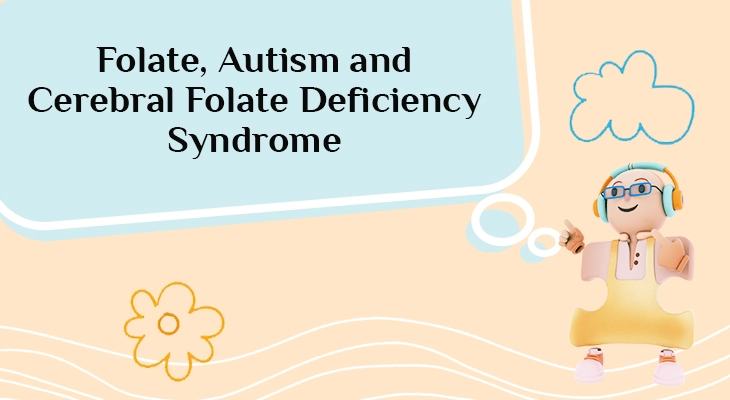
Overview of Cerebral Folate Deficiency Syndrome
Cerebral Folate Deficiency Syndrome (CFDS) is a neurological disorder characterized by low levels of folate in the cerebrospinal fluid (CSF) despite normal blood folate levels. Folate, also known as vitamin B9, is crucial for brain development and function. In CFDS, the deficiency primarily affects the central nervous system, leading to a range of neurological and developmental issues. The syndrome often presents in early childhood, with symptoms such as developmental delays, speech difficulties, motor problems, and general autistic like traits. Early detection and treatment are essential to manage the symptoms effectively and improve the quality of life for affected individuals.
Importance of Folate in Brain Function
Folate plays a vital role in brain health. It is involved in the synthesis of neurotransmitters, which are chemicals that transmit signals in the brain. Folate is also crucial for DNA synthesis and repair, processes that are particularly important during periods of rapid brain growth in early childhood. A deficiency in folate can disrupt these processes, leading to impaired brain function and development. In CFDS, the inability to maintain adequate folate levels in the brain can result in cognitive impairment, behavioral issues, and other neurological problems. Therefore, maintaining sufficient folate levels is essential for proper brain function and development.
Historical Context and Discovery
The discovery of Cerebral Folate Deficiency Syndrome can be traced back to the early 2000s when researchers began to identify children with unexplained neurological symptoms and low CSF folate levels. Initial studies focused on understanding the underlying mechanisms that could lead to such a deficiency despite normal blood folate levels. The identification of folate receptor autoantibodies, which block folate transport into the brain, was a significant breakthrough. This discovery provided critical insights into the autoimmune aspects of the syndrome and paved the way for targeted treatments, such as folinic acid supplementation. Over the years, ongoing research has continued to shed light on the genetic and environmental factors contributing to CFDS, improving diagnostic and therapeutic approaches.
Signs and Symptoms
Common Neurological and Developmental Symptoms
Cerebral Folate Deficiency Syndrome (CFDS) often presents with a variety of neurological and developmental symptoms that can be distressing for both patients and their families. One of the hallmark signs is developmental delay, where children may not reach milestones such as walking, talking, or sitting up at the expected ages. Motor problems, including hypotonia (reduced muscle tone) and ataxia (lack of muscle coordination), are also frequently observed. Seizures are another common neurological symptom, ranging from mild to severe and often requiring ongoing medical management.
Behavioral and Cognitive Manifestations
Behavioral and cognitive issues are prominent in CFDS and can significantly affect a child’s quality of life. Children with CFDS may exhibit symptoms similar to autism spectrum disorder, including social withdrawal, repetitive behaviors, and difficulties in communication. Cognitive impairments can range from mild learning difficulties to more severe intellectual disabilities. Attention deficit hyperactivity disorder (ADHD) symptoms, such as inattentiveness and hyperactivity, are also commonly reported. These behavioral and cognitive challenges often require multidisciplinary approaches for effective management, involving psychologists, educators, and therapists.
Physical Signs and Associated Conditions
Physical signs of CFDS can be varied and often include distinctive facial features, such as a high forehead or a prominent nasal bridge. Some children may experience microcephaly, a condition where the head is smaller than typical for their age and sex. Gastrointestinal issues, such as chronic diarrhea or constipation, are also frequently reported and can complicate nutritional status, further impacting overall health. Additionally, CFDS is sometimes associated with other medical conditions, such as epilepsy or cerebral palsy, which can complicate diagnosis and treatment. Understanding these physical signs and associated conditions is crucial for a comprehensive diagnosis and management plan.
Causes and Risk Factors
Genetic Mutations and Their Role
Cerebral Folate Deficiency Syndrome (CFDS) can be triggered by genetic mutations that impair folate transport and metabolism in the brain. Mutations in genes like FOLR1, which encodes the folate receptor alpha, can hinder the proper uptake of folate into the cerebrospinal fluid (CSF). Without adequate folate, critical neurological functions and development processes are disrupted. Other genetic mutations might affect enzymes involved in folate metabolism, further complicating the condition. These genetic factors typically manifest early in life, underscoring the importance of genetic screening and early intervention for families with a history of CFDS.
Autoimmune Factors, Including Folate Receptor Alpha Autoantibodies
Autoimmune responses play a significant role in CFDS, particularly through the production of folate receptor alpha autoantibodies. These antibodies attack and block the folate receptors on the choroid plexus, which is responsible for transporting folate into the CSF. This blockade prevents adequate folate from reaching the brain, resulting in neurological and developmental deficits. Autoimmune factors can be influenced by both genetic predisposition and environmental triggers, making it important to consider a comprehensive approach in diagnosing and managing CFDS. Immunotherapy and other treatments targeting these autoimmune responses are currently areas of active research.
Environmental and Dietary Influences
Environmental and dietary factors also contribute to the onset and progression of CFDS. Poor dietary intake of folate can exacerbate underlying genetic or autoimmune issues, especially during critical periods of brain development in early childhood. Environmental toxins, such as heavy metals and certain chemicals, may interfere with folate metabolism or increase the body’s immune response, leading to the production of autoantibodies. Additionally, maternal nutrition and health during pregnancy can impact the folate levels available to the developing fetus, highlighting the importance of prenatal care and folate supplementation. Understanding these influences is crucial for developing preventative strategies and dietary recommendations for those at risk.
Diagnosis and Diagnostic Tools
Clinical Criteria for Diagnosis
Diagnosing Cerebral Folate Deficiency Syndrome (CFDS) requires a thorough clinical evaluation. Physicians often start by reviewing the patient’s developmental history, noting any delays in milestones such as walking, talking, or sitting. Since CFDS presents with varied neurological symptoms, clinicians look for specific signs like hypotonia, ataxia, and seizures. Behavioral issues, including social withdrawal and communication difficulties, are also red flags. A comprehensive neurological examination helps in assessing motor coordination, muscle tone, and reflexes. Early diagnosis is crucial, as timely intervention can significantly improve outcomes. Clinicians must be vigilant and consider CFDS in children presenting with a combination of developmental delays and neurological symptoms.
Laboratory Tests and Biomarkers
Laboratory tests play a vital role in confirming a diagnosis of CFDS. The most definitive test involves measuring folate levels in the cerebrospinal fluid (CSF) through a lumbar puncture. In CFDS, CSF folate levels are typically low despite normal or elevated blood folate levels. Additional blood tests can help identify underlying causes, such as genetic mutations in the FOLR1 gene or the presence of folate receptor alpha autoantibodies (with the use of FRAT® www.fratnow.com).
Genetic testing can provide insights into hereditary aspects, while antibody testing can indicate an autoimmune basis for the deficiency. Other biomarkers, like homocysteine and methylmalonic acid levels, may also be evaluated to rule out other metabolic disorders.
Treatment Options
Folinic Acid (Leucovorin) Therapy
Folinic acid, also known as Leucovorin, is a cornerstone in the treatment of Cerebral Folate Deficiency Syndrome (CFDS). Unlike folic acid, folinic acid can bypass certain metabolic blocks and directly replenish folate levels in the cerebrospinal fluid (CSF). This is particularly beneficial for individuals with CFDS, as they often have impaired folate transport or metabolism. Administered orally or through injections, folinic acid helps restore normal neurological function and development. Clinical studies have shown significant improvements in symptoms such as motor coordination, speech, and cognitive abilities with this therapy. Early and consistent treatment with folinic acid can lead to better long-term outcomes, making it a vital intervention for managing CFDS.
Impact of Early Diagnosis and Treatment
The importance of early diagnosis and intervention in CFDS cannot be overstated. Early identification allows for timely initiation of treatment, such as folinic acid (Leucovorin) therapy, which can dramatically improve outcomes. Children who receive treatment early often experience significant improvements in motor skills, cognitive function, and overall development. Early treatment can also help manage behavioral issues and reduce the frequency and severity of seizures. The window of opportunity for the most effective intervention is typically in early childhood, before irreversible neurological damage occurs. Thus, early diagnosis and prompt treatment are fundamental in altering the disease trajectory and enhancing the quality of life for affected individuals.



